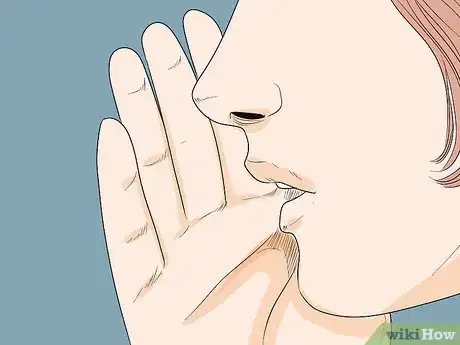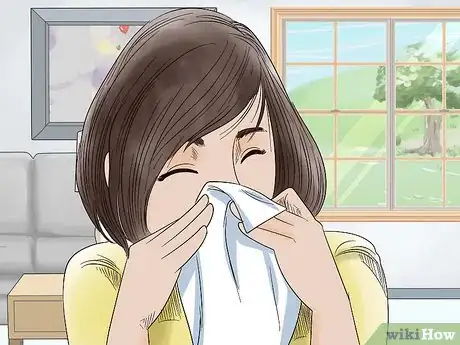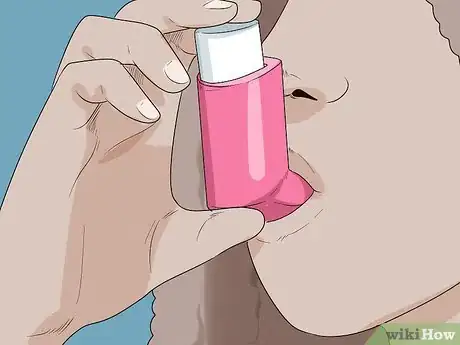This article was co-authored by Patrick Muñoz. Patrick is an internationally recognized Voice & Speech Coach, focusing on public speaking, vocal power, accent and dialects, accent reduction, voiceover, acting and speech therapy. He has worked with clients such as Penelope Cruz, Eva Longoria, and Roselyn Sanchez. He was voted LA's Favorite Voice and Dialect Coach by BACKSTAGE, is the voice and speech coach for Disney and Turner Classic Movies, and is a member of Voice and Speech Trainers Association.
There are 12 references cited in this article, which can be found at the bottom of the page.
This article has been viewed 488,710 times.
You may find yourself with a hoarse voice and not know why. Maybe you want to lower the tone of your voice for the day for a dark and raspy sound. There are several factors which could lead to that deep, dark voice.
Steps
Overusing Your Voice
-
1
-
2Sing in a high key. When you sing, your vocal chords vibrate. The higher the pitch the more rapid the vibrations. Too much of these vibrations can cause irritation to the vocal folds, which will fail to come completely together, leaving your voice raspy.
- You will need to sing beyond your vocal range to achieve this goal.
- Sing a note as high as your voice can reach, then push it further with as much breath as you can muster.
- Continue this for several hours.
Advertisement -
3Speak in a whisper. Whispering can be more stressful on the voice than speaking normally. When you whisper, you squeeze the vocal chords together more tightly and cause strain on your voice.[5]
-
4Cry a lot. Crying for an extended period of time will take its toll on your voice. This is especially the case with children or infants who have been crying all night. Their voice will likely be hoarse by the morning.
Changing Your Habits
-
1Dehydrate your body. Dehydration can take a toll on the voice. Lack of hydration can dry out the larynx, vocal folds and mucous membranes in your throat. [6]
- You can achieve this by not drinking water or even replacing water with beverages which cause dehydration like alcohol or coffee.
- Exercise and release water from your body by sweating.
- Severe dehydration can lead to confusion, headache, fever, fainting or even death. Don't get carried away.[7]
-
2Eat spicy foods. Heartburn, or acid from your stomach reaching up into your throat, will cause irritation in the tissue. Spicy foods can cause this reflux, which may also make you feel like you need to cough, further irritating the tissue around your larynx and effecting your voice.[8]
- This may not be as effective for people who regularly eat spicy foods.
- Try a cuisine your body is unfamiliar with. Some options may be Indian, Ethiopian or Chinese food.[9]
- Many restaurants with spicy food will note the spice level on the menu. Opt for the dish with the hottest spice.
- Avoid acid reflux which can create ulcers and abdominal pain. This can be treated with acid blockers.
-
3Develop a husky voice. You can practice changing the tone of your speech without injuring your throat, but changing the resonance of your voice.[10]
- Say "uhhhh" and see where it is currently resonating. If the vibration is coming from your head or nose, keep moving it downward to get it in your chest.
- Gently hold your Adam's apple, the bump in in the front and center of your throat, which moves when you swallow. Try moving it downward a quarter of an inch while you speak.
- Try creating "vocal fry" by making your voice as low as possible and using very little air to push the sound out. This should cause a gravely sound as your vocal folds audibly vibrate.[11]
Getting Sick
-
1Get a cold. A cold can lead to infection in your upper respiratory tract. This causes swelling of the vocal folds which gives the voice a hoarse effect from laryngitis.[12]
- The easiest way to catch a cold is to expose yourself to the germs of someone who is already infected.
- You can't actually catch a cold by making yourself cold. Although, exposing your throat to the cold could make it hoarse.[13]
- Most colds go away in 7-10 days, but they can be pretty miserable. If the cold does not go away, it may need to be treated with antibiotics.[14]
-
2Expose yourself to allergens. Inhaling pollen can inflame your vocal folds. Inflammation in your lungs and nasal drip can cause changes to your voice leaving it hoarse.[15]
- If you take antihistamines to solve the problem of excess mucus, it could actually dry the protective mucus in your throat leaving your voice even more raspy and hoarse.
-
3Use an inhaler too often. People with asthma can treat their symptoms with an inhaler. Using an inhaler over the long term can cause a hoarse voice. Also, repeated dosing can lead to a low-grade yeast infection in the mouth and throat increasing the hoarseness of your voice.[16]
- Be sure to work with your doctor to find the appropriate dosage.
- Visit the doctor to treat a yeast infection.
Community Q&A
-
QuestionWhy would anyone want this? My voice is hoarse; I was looking for a solution and this popped up. What good could this possibly do?
 Community AnswerMany people find hoarse/raspy voices, both in singing and talking, very attractive.
Community AnswerMany people find hoarse/raspy voices, both in singing and talking, very attractive. -
QuestionWhy would I need a hoarse voice?
 Community AnswerYou don't need it, but maybe you'd like for your voice to sound different.
Community AnswerYou don't need it, but maybe you'd like for your voice to sound different. -
QuestionHow can I smoothly change my voice to a hoarse voice?
 Community AnswerWhispering for a long time, yelling, eating spicy foods and even crying a lot can all lead to a hoarse voice. However, your voice won't stay hoarse permanently.
Community AnswerWhispering for a long time, yelling, eating spicy foods and even crying a lot can all lead to a hoarse voice. However, your voice won't stay hoarse permanently.
Warnings
- If you continue to use your voice or scream or shout or whisper while your throat is burning, callouses and little lumps will form on your vocal chords and cause damage to your voice box.⧼thumbs_response⧽
- Smoking, creating nodules on your vocal chords and developing other medical issues like colds and thyroid problems are detrimental to your health. Consider these consequences before trying to create a hoarse voice. See your doctor if you are experiencing these health problems.⧼thumbs_response⧽
References
- ↑ Patrick Muñoz. Voice & Speech Coach. Expert Interview. 12 November 2019.
- ↑ https://www.nidcd.nih.gov/health/hoarseness
- ↑ https://www.uu.edu/dept/music/library/safety/VocalHealthInformation.pdf
- ↑ https://www.uu.edu/dept/music/library/safety/VocalHealthInformation.pdf
- ↑ Patrick Muñoz. Voice & Speech Coach. Expert Interview. 12 November 2019.
- ↑ Patrick Muñoz. Voice & Speech Coach. Expert Interview. 12 November 2019.
- ↑ http://www.webmd.com/a-to-z-guides/dehydration-adults
- ↑ https://www.nidcd.nih.gov/health/hoarseness
- ↑ http://www.eater.com/2015/4/20/8447099/spicy-food-indian-chinese-thai
- ↑ http://www.seductionscience.com/2011/12-great-voice-exercises-for-developing-a-sexy-seductive-voice/
- ↑ http://www.become-a-singing-master.com/how-to-do-vocal-fry.html
- ↑ http://www.entnet.org/content/hoarseness
- ↑ https://www.lung.org/lung-health-diseases/lung-disease-lookup/facts-about-the-common-cold
- ↑ https://my.clevelandclinic.org/health/diseases/12342-common-cold
- ↑ https://floridaentcare.com/sinus/allergy-related-laryngitis/
- ↑ http://www.asthma.partners.org/NewFiles/InhaledSteroids.html
About This Article
To make your voice hoarse, overuse your voice by yelling a lot. For instance, you can speak at a high volume for several hours or cheer on a favorite band or team. Alternatively, try whispering a lot since this can be even more stressful on your voice than speaking normally. Another way to get a hoarse voice is to sing in a higher key than normal since this will cause irritation to your vocal cords. If you want to develop a husky voice without irritating your throat, try to speak in a gravelly tone, also known as "vocal fry," to create a low, husky, sound. To learn how to use spicy foods to get a hoarse voice, keep reading!







































































Medical Disclaimer
The content of this article is not intended to be a substitute for professional medical advice, examination, diagnosis, or treatment. You should always contact your doctor or other qualified healthcare professional before starting, changing, or stopping any kind of health treatment.
Read More...